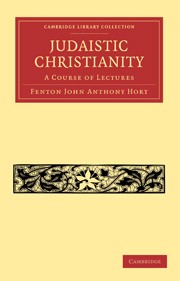Book contents
- Frontmatter
- PREFACE
- Contents
- I INTRODUCTORY LECTURE
- II CHRIST AND THE LAW
- III THE EARLY CHURCH AT JERUSALEM
- IV THE CHURCH OF ANTIOCH
- V THE INDEPENDENT ACTIVITY OF ST PAUL
- VI ST PAUL AT JERUSALEM AND THE EPISTLES OF THE ROMAN CAPTIVITY
- VII THE PASTORAL EPISTLES
- VIII JAMES, I PETER, HEBREWS, APOCALYPSE
- IX THE CHURCH OF JERUSALEM FROM TITUS TO HADRIAN
- X THE JUDAIZERS OF THE IGNATIAN EPISTLES
- XI CERINTHUS, ‘BARNABAS,’ JUSTIN MARTYR
- XII PALESTINIAN EBIONITES
- APPENDIX
- INDEX
I - INTRODUCTORY LECTURE
Published online by Cambridge University Press: 07 September 2011
- Frontmatter
- PREFACE
- Contents
- I INTRODUCTORY LECTURE
- II CHRIST AND THE LAW
- III THE EARLY CHURCH AT JERUSALEM
- IV THE CHURCH OF ANTIOCH
- V THE INDEPENDENT ACTIVITY OF ST PAUL
- VI ST PAUL AT JERUSALEM AND THE EPISTLES OF THE ROMAN CAPTIVITY
- VII THE PASTORAL EPISTLES
- VIII JAMES, I PETER, HEBREWS, APOCALYPSE
- IX THE CHURCH OF JERUSALEM FROM TITUS TO HADRIAN
- X THE JUDAIZERS OF THE IGNATIAN EPISTLES
- XI CERINTHUS, ‘BARNABAS,’ JUSTIN MARTYR
- XII PALESTINIAN EBIONITES
- APPENDIX
- INDEX
Summary
The Subject of the course
The subject on which I propose to lecture this Term is the History of Judaistic Christianity in the Apostolic and following Ages. The phrase ‘Judaistic Christianity’ is more ambiguous than might be wished; but it is difficult to find another more precise. To prevent any misunderstanding as to the sense in which I propose to use it, it will be well to begin with explaining what are the senses which might not unnaturally be attributed to this phrase, but which lie outside the purpose of these lectures.
Christianity not Judaistic in spirit only
First, by Judaistic Christianity I do not mean such Christianity as is Judaistic in tone and spirit only. The whole course of Church History is full of beliefs, practices, institutions, and the like, which rest on misconceptions of the true nature of the Gospel dispensation, and are in effect a falling back after the coming of Christ to a state of things which His coming was intended to supersede, a return, as St Paul would have said, to the weak and beggarly elements. Such a Christianity however, though strictly analogous to the Judaistic Christianity of the apostolic age, is not itself strictly, i.e. historically, Judaistic. It has its origin in permanent tendencies of human nature, not chiefly or directly in imitation of Judaism, though it may borrow this or that detail from Jewish precedent.
- Type
- Chapter
- Information
- Judaistic ChristianityA Course of Lectures, pp. 1 - 12Publisher: Cambridge University PressPrint publication year: 2009First published in: 1894



